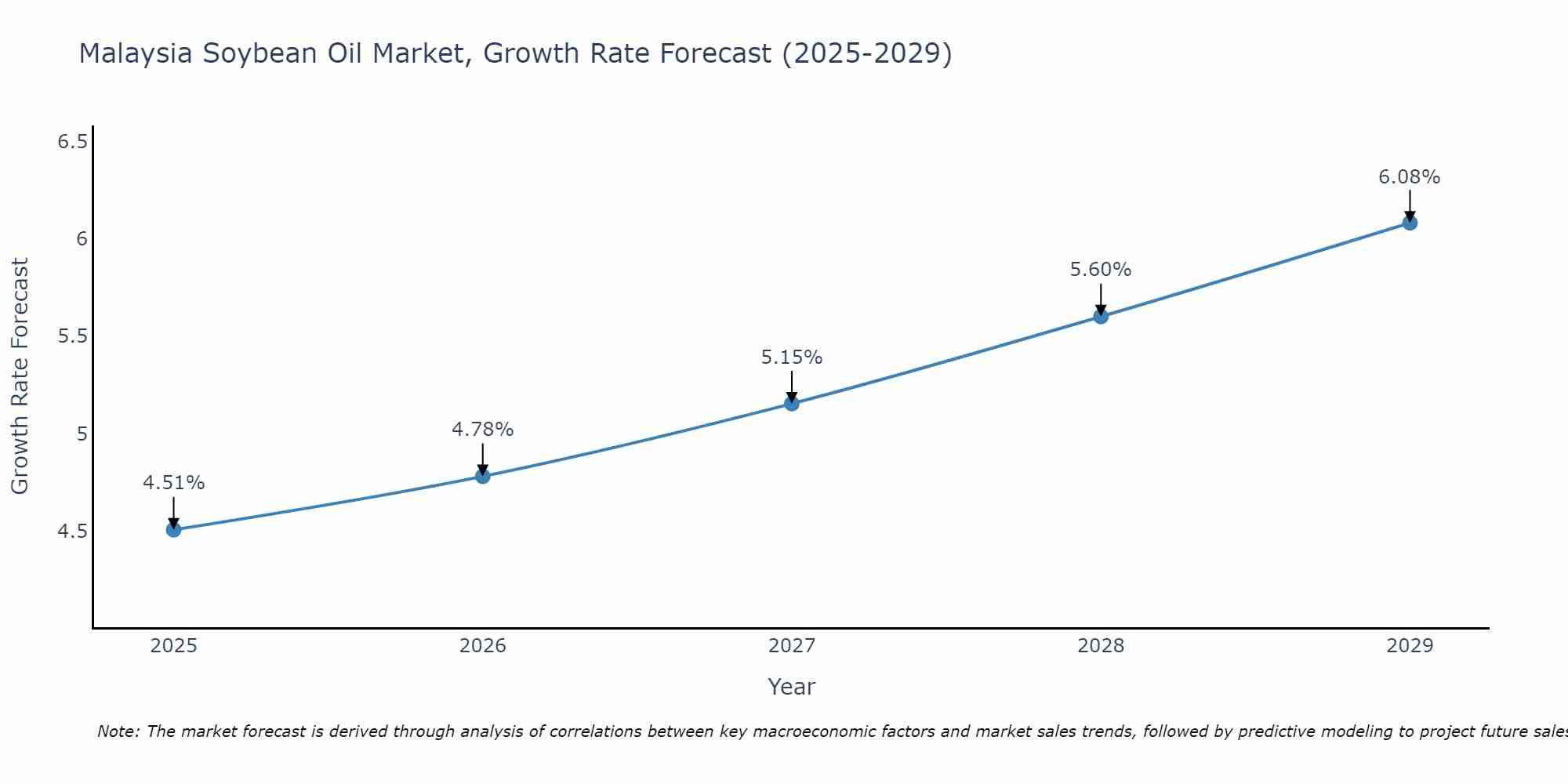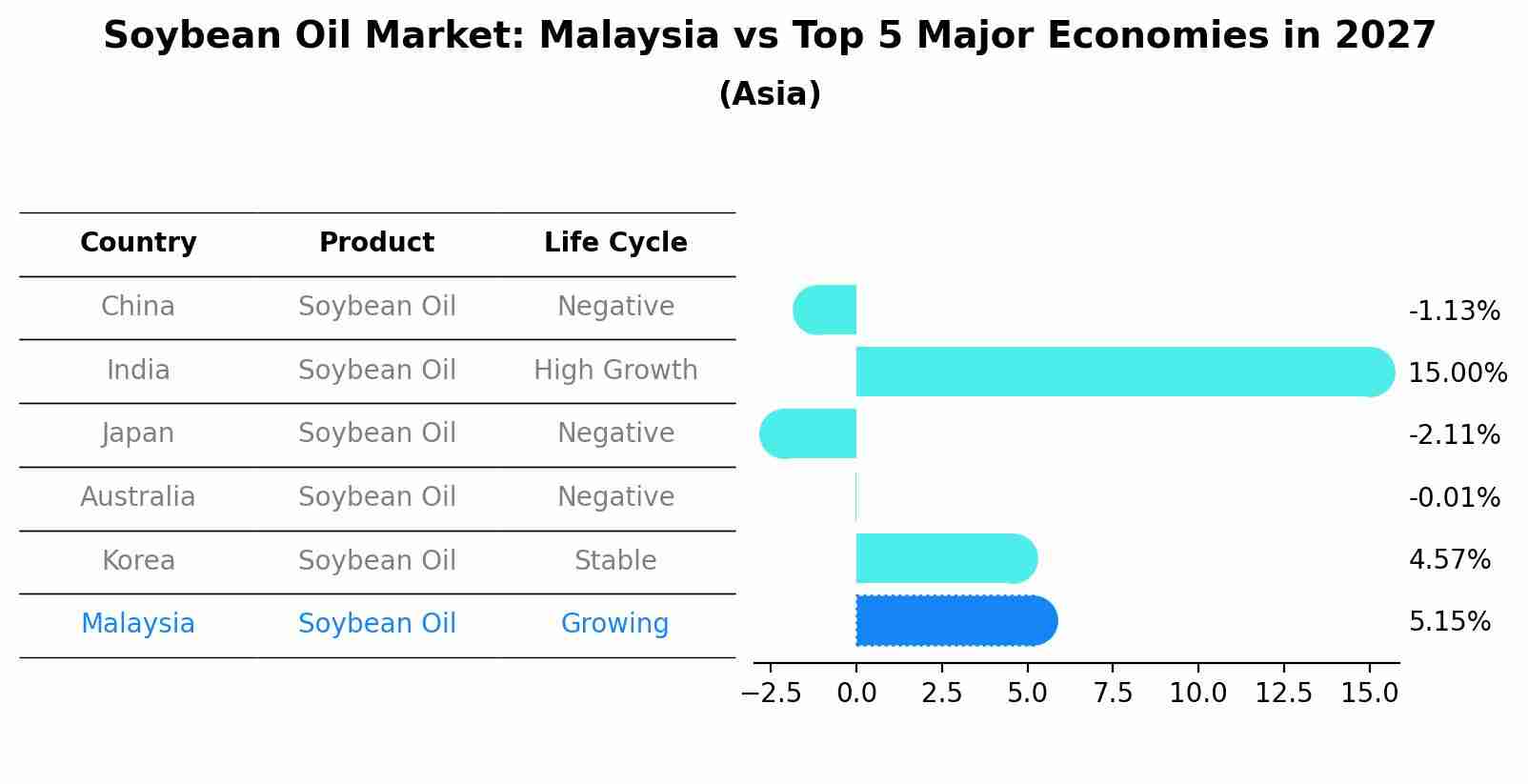Malaysia Soybean Oil Market (2025-2031) Outlook | Revenue, Growth, Size, Share, Trends, Analysis, Industry, Forecast, Value & Companies
| Product Code: ETC385046 | Publication Date: Aug 2022 | Updated Date: Apr 2025 | Product Type: Market Research Report | |
| Publisher: 6Wresearch | Author: Ravi Bhandari | No. of Pages: 75 | No. of Figures: 35 | No. of Tables: 20 |
Malaysia Soybean Oil Market Size Growth Rate
The Malaysia Soybean Oil Market is likely to experience consistent growth rate gains over the period 2025 to 2029. Commencing at 4.51% in 2025, growth builds up to 6.08% by 2029.

Soybean Oil Market: Malaysia vs Top 5 Major Economies in 2027 (Asia)
By 2027, the Soybean Oil market in Malaysia is anticipated to reach a growth rate of 5.15%, as part of an increasingly competitive Asia region, where China remains at the forefront, supported by India, Japan, Australia and South Korea, driving innovations and market adoption across sectors.

Malaysia Soybean Oil Market Synopsis
The soybean oil market in Malaysia is experiencing steady growth, primarily attributed to its versatile applications in the food industry. Soybean oil is widely used in cooking, baking, frying, and as an ingredient in various processed foods. Additionally, its relatively neutral flavor and high smoke point make it a popular choice among consumers and food manufacturers. The market is also influenced by the health-conscious trend, as soybean oil is perceived as a healthier alternative to some other cooking oils. Government efforts to promote sustainable palm oil production may also indirectly impact the soybean oil market by influencing consumer preferences.
Drivers of the Market
The Malaysia soybean oil market is poised for growth due to several factors. Firstly, the increasing consumption of edible oils in the country, driven by changing dietary habits and urbanization, contributes to the demand for soybean oil. Soybean oil is a versatile cooking oil and is widely used in various food preparations. Additionally, the growing awareness of the health benefits associated with soybean oil, such as its heart-healthy properties, enhances its market prospects. The country`s reliance on imports to meet its edible oil demand presents opportunities for domestic soybean oil production and processing. Market players should focus on product quality and health-related marketing strategies to cater to the evolving consumer preferences.
Challenges of the Market
The soybean oil market in Malaysia is navigating challenges related to shifting consumer preferences and health concerns. With increasing awareness about the health implications of certain types of oils, there has been a shift away from traditional cooking oils, including soybean oil. This has prompted the industry to explore alternatives and invest in marketing efforts to educate consumers about the benefits of soybean oil. Additionally, competition from other oils, such as palm oil and sunflower oil, adds further complexity to the market dynamics.
COVID-19 Impact on the Market
The Malaysia soybean oil market has faced challenges during the pandemic, with fluctuations in demand driven by disruptions in the foodservice and restaurant industries. However, the market is expected to recover as the food industry adapts to new norms and consumer habits evolve. Producers may consider diversifying their product lines and marketing strategies to cater to changing preferences in cooking oils.
Key Players in the Market
In the competitive Malaysia soybean oil market, key players like Cargill and Wilmar International have established their prominence. Cargill is renowned for its extensive portfolio of high-quality soybean oil products and its commitment to sustainable sourcing practices. Similarly, Wilmar International, a global agribusiness powerhouse, has a strong presence in the Malaysia market, offering a wide range of soybean oil solutions to meet consumer and industrial demands.
Key Highlights of the Report:
- Malaysia Soybean Oil Market Outlook
- Market Size of Malaysia Soybean Oil Market, 2024
- Forecast of Malaysia Soybean Oil Market, 2031
- Historical Data and Forecast of Malaysia Soybean Oil Revenues & Volume for the Period 2021-2031
- Malaysia Soybean Oil Market Trend Evolution
- Malaysia Soybean Oil Market Drivers and Challenges
- Malaysia Soybean Oil Price Trends
- Malaysia Soybean Oil Porter's Five Forces
- Malaysia Soybean Oil Industry Life Cycle
- Historical Data and Forecast of Malaysia Soybean Oil Market Revenues & Volume By End-Use for the Period 2021-2031
- Historical Data and Forecast of Malaysia Soybean Oil Market Revenues & Volume By Food for the Period 2021-2031
- Historical Data and Forecast of Malaysia Soybean Oil Market Revenues & Volume By Feed for the Period 2021-2031
- Historical Data and Forecast of Malaysia Soybean Oil Market Revenues & Volume By Industrial for the Period 2021-2031
- Malaysia Soybean Oil Import Export Trade Statistics
- Market Opportunity Assessment By End-Use
- Malaysia Soybean Oil Top Companies Market Share
- Malaysia Soybean Oil Competitive Benchmarking By Technical and Operational Parameters
- Malaysia Soybean Oil Company Profiles
- Malaysia Soybean Oil Key Strategic Recommendations
Frequently Asked Questions About the Market Study (FAQs):
- Single User License$ 1,995
- Department License$ 2,400
- Site License$ 3,120
- Global License$ 3,795
Search
Thought Leadership and Analyst Meet
Our Clients
Related Reports
- South Africa Stationery Market (2025-2031) | Share, Size, Industry, Value, Growth, Revenue, Analysis, Trends, Segmentation & Outlook
- Afghanistan Rocking Chairs And Adirondack Chairs Market (2026-2032) | Size & Revenue, Competitive Landscape, Share, Segmentation, Industry, Value, Outlook, Analysis, Trends, Growth, Forecast, Companies
- Afghanistan Apparel Market (2026-2032) | Growth, Outlook, Industry, Segmentation, Forecast, Size, Companies, Trends, Value, Share, Analysis & Revenue
- Canada Oil and Gas Market (2026-2032) | Share, Segmentation, Value, Industry, Trends, Forecast, Analysis, Size & Revenue, Growth, Competitive Landscape, Outlook, Companies
- Germany Breakfast Food Market (2026-2032) | Industry, Share, Growth, Size, Companies, Value, Analysis, Revenue, Trends, Forecast & Outlook
- Australia Briquette Market (2025-2031) | Growth, Size, Revenue, Forecast, Analysis, Trends, Value, Share, Industry & Companies
- Vietnam System Integrator Market (2025-2031) | Size, Companies, Analysis, Industry, Value, Forecast, Growth, Trends, Revenue & Share
- ASEAN and Thailand Brain Health Supplements Market (2025-2031) | Strategy, Consumer Insights, Analysis, Investment Trends, Opportunities, Growth, Size, Share, Industry, Revenue, Segments, Value, Segmentation, Supply, Forecast, Restraints, Outlook, Competition, Drivers, Trends, Demand, Pricing Analysis, Competitive, Strategic Insights, Companies, Challenges
- ASEAN Bearings Market (2025-2031) | Strategy, Consumer Insights, Analysis, Investment Trends, Opportunities, Growth, Size, Share, Industry, Revenue, Segments, Value, Segmentation, Supply, Forecast, Restraints, Outlook, Competition, Drivers, Trends, Demand, Pricing Analysis, Competitive, Strategic Insights, Companies, Challenges
- Europe Flooring Market (2025-2031) | Outlook, Share, Industry, Trends, Forecast, Companies, Revenue, Size, Analysis, Growth & Value
Industry Events and Analyst Meet
Whitepaper
- Middle East & Africa Commercial Security Market Click here to view more.
- Middle East & Africa Fire Safety Systems & Equipment Market Click here to view more.
- GCC Drone Market Click here to view more.
- Middle East Lighting Fixture Market Click here to view more.
- GCC Physical & Perimeter Security Market Click here to view more.
6WResearch In News
- Doha a strategic location for EV manufacturing hub: IPA Qatar
- Demand for luxury TVs surging in the GCC, says Samsung
- Empowering Growth: The Thriving Journey of Bangladesh’s Cable Industry
- Demand for luxury TVs surging in the GCC, says Samsung
- Video call with a traditional healer? Once unthinkable, it’s now common in South Africa
- Intelligent Buildings To Smooth GCC’s Path To Net Zero


















